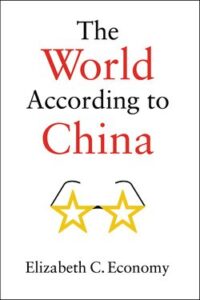Chinese authorities have detained two prominent human-rights activists, quietly intensifying a crackdown on dissent weeks before Beijing hosts the most politicized Winter Olympics in recent memory, The Wall Street Journal reports:
Free-speech advocate Yang Maodong – who writes under the pen name Guo Feixiong – was formally detained in the southern city of Guangzhou on suspicion of inciting subversion on Jan. 12, two days after his wife died of cancer in the U.S., according to his sister….Xie Yang, a 49-year old lawyer who has taken up politically sensitive cases related to religion and land rights, was detained on Jan. 11, also on subversion charges, and is being held in the southern city of Changsha, according to his family. ….Human-rights advocates linked the detentions to the coming 2022 Winter Games, scheduled to begin on Feb. 4, which have been dogged by criticism over China’s human-rights record.
 “You can imagine authorities all over the country are tightening control pre-emptively to strike out any potential dissent and criticism,” said Renee Xia, a senior researcher with Chinese Human Rights Defenders, a Washington, D.C., based group.
“You can imagine authorities all over the country are tightening control pre-emptively to strike out any potential dissent and criticism,” said Renee Xia, a senior researcher with Chinese Human Rights Defenders, a Washington, D.C., based group.
The Beijing Winter Olympics and Paralympics should not be allowed to become a “sportswashing” opportunity for China, warned Amnesty International, insisting that “the international community must not become complicit in a propaganda exercise”.
Analysts increasingly fear that Beijing’s national security law, initially aimed at quelling dissent in Hong Kong, may be used to target people of any nationality or ethnicity who offend Chinese leaders, VOA reports.
 Beijing’s aim, and the fundamental challenge it poses, is to recast the values and norms that define the current rules-based international order shaped by the US over nearly 80 years so that they more closely align with its own authoritarian system. Consider its use of hostage diplomacy, its disregard for international law and treaties, and its use of economic coercion in a potential breach of global trade rules, says Mary Hui.
Beijing’s aim, and the fundamental challenge it poses, is to recast the values and norms that define the current rules-based international order shaped by the US over nearly 80 years so that they more closely align with its own authoritarian system. Consider its use of hostage diplomacy, its disregard for international law and treaties, and its use of economic coercion in a potential breach of global trade rules, says Mary Hui.
That’s the picture that Elizabeth Economy, currently senior advisor for China to the US Secretary of Commerce while on leave from her position as senior fellow at Stanford’s Hoover Institution, paints in detail in her new book, The World According to China, she writes for Quartz.
As China prepares to host the Winter Olympics, its economy is slowing, its real estate sector is in crisis, and its push for regional dominance is alarming its neighbors. At the 20th Party Congress this October, Xi Jinping is expected to win a third term as China’s ruler. What do these developments portend for China and the world, and how should the United States respond? The Hoover Project on China’s Global Sharp Power asks.
China on the Eve of the Winter Olympics: Hard Choices for the World’s Democracies
OPENING REMARKS BY George Soros, Chair, Soros Fund Management, Founder and Chair, Open Society Foundations
CONVERSATION FEATURING Matt Pottinger, Distinguished Visiting Fellow, Hoover Institution, Former US Deputy National Security Advisor; Oriana Skylar Mastro, Center Fellow, Freeman Spogli Institute for International Studies, Stanford University
INTRODUCTION BY Glenn Tiffert, Research Fellow, Hoover Institution
MODERATED BY Larry Diamond, Senior Fellow, Hoover Institution
WITH PARTICIPATION FROM Orville Schell, Arthur Ross Director, Center on U.S.-China Relations
Asia Society
Jan 31, 2022 10:00 AM in Pacific Time (US and Canada) RSVP

Beijing’s aim is to recast the values & norms that define the current rules-based international order so that they more closely align with its own #authoritarian system, says @qz analyst @maryhui https://t.co/y7MPLlz8wD
— Democracy Digest (@demdigest) January 19, 2022







